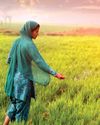
WHEN A group of 20 farmers in Andhra Pradesh's Alluri Sitharama Raju district ventured into production of seeds of finger millet (ragi) and little millet (samai) in 2019, it had no idea what the future had in store. For the next two years, unusual weather events ensured that the crops did not have grains good enough for use as seeds. "The years 2020 and 2021 saw excess rain in July and August. This did not allow the plants to take nutrition from the soil. The resultant grains were weak and the endosperm-part of a seed that stores food for the development of a plant and is crucial for germination-was absent when the seeds were crushed open for inspection," says M L Sanyasi Rao, programme manager of Watershed Support Services and Activities Network, a non-profit working with tribal farmers in the area. The farmers had estimated 20 tonnes of produce, but the harvest in November 2021 resulted in only 15 tonnes, with the grains unusable as seeds. The harvest was then sold as crop for 25 per kg, while its sale as seed would have fetched 35 per kg.
There is no difference in the cultivation mechanism for producing seeds or for growing crops. Vast majority of farmers in India set aside a part of their field for growing seeds that can be used the next season. But climate change has posed a threat to seeds, which are essential for food security of the country. Grains of wheat and rice, the two staples distributed under the government's public distribution system and crucial to food security, have also seen a shrinkage in recent years, say farmers.
"Usually, the share of light or weak grains is 5-7 per cent. But last year, over 20 per cent of my wheat grains were of poor quality. These cannot be used as seeds," says Vikas Choudhary, a farmer from Karnal district in Haryana. Choudhary works as a participatory farmer with the Indian Agricultural Research Institute (IARI) under Indian Council of Agricultural Research's (ICAR'S) seed production programme.
This story is from the {{IssueName}} edition of {{MagazineName}}.
Start your 7-day Magzter GOLD free trial to access thousands of curated premium stories, and 9,000+ magazines and newspapers.
Already a subscriber ? Sign In
This story is from the {{IssueName}} edition of {{MagazineName}}.
Start your 7-day Magzter GOLD free trial to access thousands of curated premium stories, and 9,000+ magazines and newspapers.
Already a subscriber? Sign In

On shaky ground
Despite reporting net gains in green cover, the latest forest survey shows degradation of natural forests, particularly in ecologically sensitive hotspots

Burden of proof
The government's drive for e-KYC verification to ensure rightful targeting of beneficiaries has proved exclusionary for many

Rupee slide impacts agricultural trade
THE UNION Cabinet on January 1, 2025, approved the extension of a subsidy package of ₹3,500 per tonne on di-ammonium phosphate (DAP) for companies.

THE 500 GW SWITCH OVER
Coal is the king of energy at present. India needs to dislodge it with clean energy for an equitable green transition

MANIFESTING 500 GW
Ensure that renewable energy is available round the clock.Establish a viable market and reward those who take lead

Lifting a curse
How Gangabai Rajput helped her water-scarce village in Madhya Pradesh let go of superstition and revive an ancient waterbody

HOLD THEM SACRED
The Supreme Court has recommended that the Union government create a comprehensive policy for the governance and management of sacred groves across the country

REPORT CARD 2024
Coal is still the king in terms of electricity generation. But new renewables, mainly solar power, have shown an impressive growth

'India a laboratory for seismologists'
India is no stranger to earthquakes. In recent memory, Latur and Bhuj districts in Maharashtra and Gujarat witnessed devastating tremors in 2003 and 2001 respectively. Such quakes leave clues that can aid preparations for future events, say seismologists KUSALA RAJENDRAN, professor, Indian Institute of Science, and CP RAJENDRAN, adjunct professor, National Institute of Advanced Studies. The Rumbling Earth-The Story of Indian Earthquakes, captures their work on historical as well as recent quakes. In an interview with ROHINI KRISHNAMURTHY, they discuss the science of earthquakes, why the Himalayas are due for a huge event and why prediction remains a challenge. Excerpts:

Capturing Siang
As India pushes for a mega-dam on the Siang river to counter China's upstream projects, the Adi tribal community of Arunachal Pradesh fears losing ancestral land